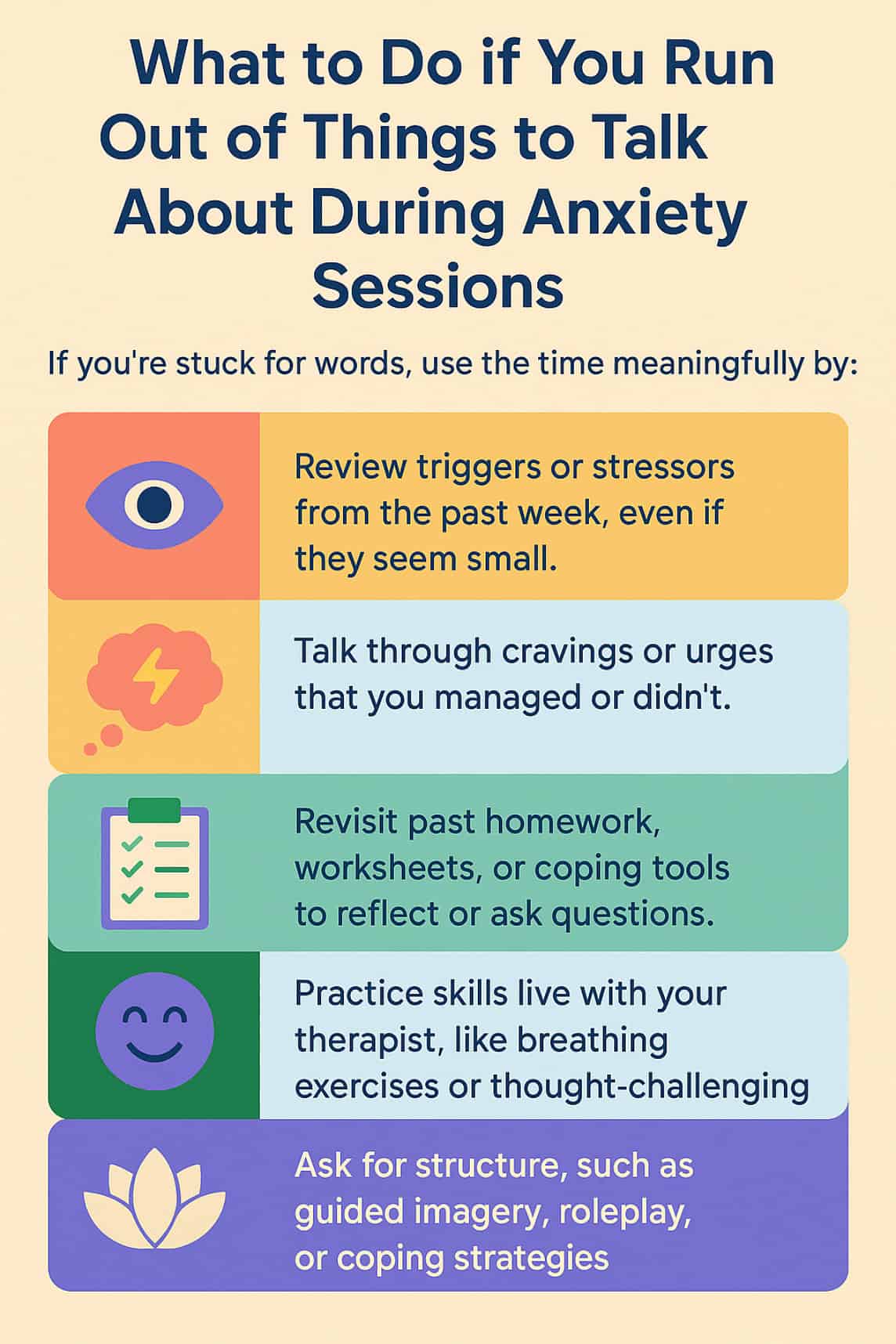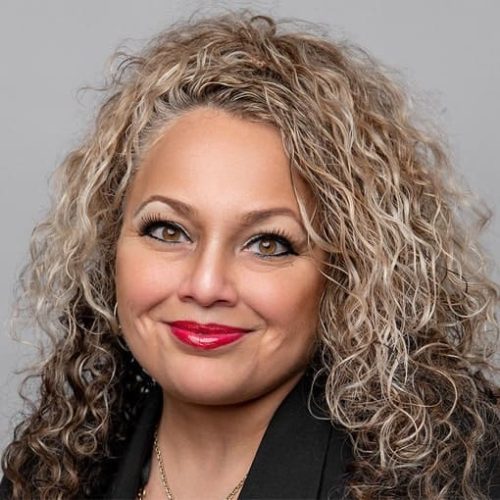
Key Takeaways for When Running Out of Things to Talk About During Anxiety Sessions.
- Reviewing triggers or stressors from the past week, even if they seem small.
- Talking through cravings or urges that you managed or didn’t.
- Revisiting past homework, worksheets, or coping tools to reflect or ask questions.
- Practising skills live with your therapist, like breathing exercises or thought-challenging.
- Asking for structure, such as guided imagery, roleplay, or coping strategies.
🎯 Your session doesn’t need to be packed with new topics every time. Slower days can be powerful too.
👉 Ready to take the next step? Learn more about anxiety therapy at AERCS and how to book your free 15-minute phone consultation.

If you find yourself sitting in your therapist’s office and drawing a blank, shift the focus of your anxiety sessions to three easy prompts: review any recent triggers or cravings, revisit last week’s homework to see what worked or stalled, and ask your therapist to guide you through a structured exercise, such as breathing practice or brief imagery. These steps keep the hour productive and ensure you leave with fresh insight and useful homework.
Start with a Quick Check-In.
Even on a “quiet” week, your therapist will begin with a short check-in. Use it to mention:
- Tiny stressors, like traffic delays or a tense email.
- Subtle body cues, such as shallow breathing or clenched jaws.
- Any moments when cravings or avoidance nudged you.
Small observations often reveal patterns that fuel anxiety, and they give your therapist data to explore.
Set an Agenda Together.
Why an Agenda Helps.
A clear plan prevents awkward silence and makes the best use of your time.
Agenda Ideas When You Feel Stuck.
- Highlight one recent feeling you did not expect.
- Choose a skill you want to polish, such as grounding.
- Ask a curiosity question, for example, “Why do I feel empty after social events?”
Co-creating the agenda puts you back in control, even if the session started slowly.
Review Last Week’s Homework.
Did you:
- Complete a thought record?
- Practise breathing drills before bed?
- Log anxiety scores in your phone?
Discuss what felt easy, what felt hard, and any barriers you hit. Your therapist can then tweak the assignment or role-play the skill with you right in the session.
Explore New Material or Guided Exercises.
Ask your therapist to introduce something fresh. Popular options include:
| Exercise | What It Looks Like | Why It Helps |
|---|---|---|
| Guided Imagery | Therapist narrates a safe, calming scene | Lowers physiological arousal |
| Body Scan | Slow attention from head to toes | Identifies hidden tension |
| Values Check | List top five life values | Aligns actions with long-term goals |
Trying a new activity on a “slow” day keeps momentum going and often sparks conversation.
Address Sudden Triggers or Cravings.
If you are in recovery from alcohol, cannabis, or other substances, bring up any urges that popped up, even if you resisted them. Your therapist can:
- Link the urge to an anxiety spike.
- Practise a coping skill in real time.
- Adjust your relapse-prevention plan.
Flexibility is built into well-run anxiety sessions, so do not hesitate to pivot.
Finish with Homework and a Coping Plan.
Every productive session ends with:
- Specific homework, such as repeating a new skill three times this week.
- A written coping plan listing numbers to call, grounding steps, and self-soothing ideas if anxiety surges.
Knowing the next action keeps you confident and safe until your following appointment.
Running out of topics is normal.
Simply use the structure of anxiety sessions, check-in, agenda setting, skills review, new material, and homework with a coping plan, to guide you. By reviewing small stressors, revisiting past assignments, and requesting guided exercises, you will always leave with fresh insight and a clear next step.
Ready for structured support? Visit our Anxiety Therapy page and book your free 15-minute phone consultation. Let’s keep your sessions focused and effective.
What if I freeze during my anxiety sessions?
Bring up even small feelings; your therapist will guide the conversation.
Can I prepare notes for anxiety sessions?
Yes, jotting down triggers or questions keeps anxiety sessions focused.
Is it okay to revisit old homework in anxiety sessions?
Absolutely, reviewing past assignments often sparks new insight.
How do anxiety sessions stay flexible for sudden crises?
The agenda can shift anytime so urgent triggers are addressed promptly.
Why end anxiety sessions with a coping plan?
A coping plan ensures you feel safe and equipped until the next visit.
Do You Need Anxiety Therapy?
Take this quick self-assessment to see if anxiety therapy could help you manage symptoms.Note: This questionnaire is educational only and does not replace a clinical assessment. If you wish to obtain professional guidance, please follow up with a licensed mental health professional.

